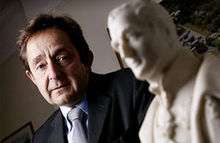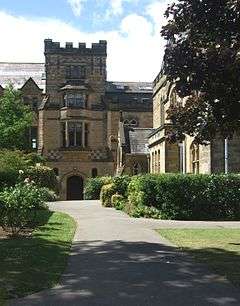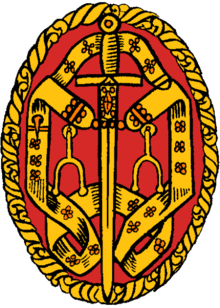Anthony Seldon
Sir Anthony Francis Seldon FRSA FRHistS FKC (born 2 August 1953)[1] is a British educator and contemporary historian who is Vice-Chancellor of the University of Buckingham. As an author, he is known in part for his political biographies of Margaret Thatcher, John Major, Tony Blair, Gordon Brown and David Cameron. He was the 13th Master (headmaster) of Wellington College, one of Britain's co-educational independent boarding schools.[2] In 2009, he set up The Wellington Academy, the first state school to carry the name of its founding independent school.[3] Before that, he was head of Brighton College.
Sir Anthony Seldon | |
|---|---|
 | |
| Born | Anthony Francis Seldon 2 August 1953[1] Stepney, London, England |
| Nationality | British |
| Alma mater | Worcester College, Oxford (BA) London School of Economics (PhD) Polytechnic of Central London (MBA) King's College London (PGCE) |
| Occupation | Head master, contemporary historian, commentator and political author |
| Known for | Master of Wellington College Vice Chancellor of the University of Buckingham |
| Family | Arthur Seldon (father) |
| Website | www buckingham |
Seldon is the author or editor of more than 35 books on contemporary history, politics and education. He was the co-founder and first director of the Centre for Contemporary British History, is the co-founder of Action for Happiness,[4] is a governor of the Royal Shakespeare Company[5], and is on the board of a number of charities and educational bodies.
He is also both honorary historical adviser to 10 Downing Street and a member of the First World War Centenary Culture Committee. Seldon was knighted in the 2014 Birthday Honours for services to education and modern political history.[6][7]
Early life and education

Seldon was born in Stepney,[8] the youngest son of economist Arthur Seldon, who co-founded the Institute of Economic Affairs and directed academic affairs at the think tank for 30 years.[1] His father was the child of Jewish immigrants who fled anti-semitic pogroms in Russia.[9]
Seldon was educated first at Bickley Park School[10], then Tonbridge School , followed by Worcester College, Oxford, where he received a BA degree in Politics, Philosophy and Economics. He then obtained a PhD degree in Economics at the London School of Economics in 1981.[11] He also has an MBA degree from the Polytechnic of Central London.[1] He qualified as a schoolteacher at King's College London, where he was awarded the top teaching prize in the year across all subjects.
Career
Seldon's first teaching appointment was at Whitgift School in Croydon in 1983, where he was Head of Politics and taught in the Sixth Form. In 1989 he returned to his old school, Tonbridge, and became Head of History and General Studies. In 1993 he was appointed Deputy Headmaster and, ultimately, Acting Headmaster of St Dunstan's College in London. He then became Headmaster of Brighton College from September 1997 until he joined Wellington College in January 2006 as its 13th Master. He became Executive Principal at The Wellington Academy (a separate school) in 2013.
He took a three-month sabbatical from January to March 2014 (leaving Wellington to be run in the interim by his Second Master, Robin Dyer, who as Acting Master, stated it would be "business as usual").[12] Dr Seldon announced on 23 April 2014 that he would be leaving Wellington College in the summer of 2015, after nearly ten years as the 13th Master.[13]
In September 2015, he replaced Terence Kealey as Vice-Chancellor of University of Buckingham, the first private university in Britain.[14]
History, politics and other writing
Anthony Seldon's books include Churchill's Indian Summer (1981),[15] which won a Best First Work Prize; Major, A Political Life (1997);[16] The Powers Behind the Prime Minister (1999) co-written with Professor Dennis Kavanagh;[17] 10 Downing Street: The Illustrated History (2000);[18] The Foreign Office: The Illustrated History Of The Place And Its People (2001);[19] Blair (2004);[20] Blair Unbound (2007),[21] Trust (2009);[22] Brown at 10 (2010) with Guy Lodge;[23] Public Schools and The Great War (2013) with David Walsh;[24] The Architecture of Diplomacy: The British Ambassador's Residence in Washington (2014) with Daniel Collings;[25] and Cameron at 10 (2015) with Peter Snowdon. He has edited many books, including the series The Thatcher Effect (1989);[26] The Major Effect (1994);[27] The Blair Effect (2001);[28] The Blair Effect 2001–2005 (2005);[29] Blair's Britain (2007);[30] and The Cameron Effect (2015) with Dr Mike Finn.
Other edited books include Ruling Performance, with Professor Peter Hennessy and Conservative Century, with Professor Stuart Ball. He has written a number of booklets on education, including Private and Public Education: The Divide Must End (2000);[31] Partnership not Paternalism (2001); An End To Factory Schools (2010);[32] The Politics of Optimism (2012); and School United (2014). His 2011 Cass Lecture was published as 'Why Schools? Why Universities?'[33] He also founded two journals, Contemporary British History (as Contemporary Record) and Twentieth Century British History. During his time at Brighton College, Seldon wrote Brave New City: Brighton & Hove Past, Present, Future, an analysis of the city of Brighton and Hove focused principally on its buildings.[34]
Work in education
Seldon is a head teacher and appears on television and radio and in the press,[35] and has written regularly for national newspapers including The Times,[36] The Sunday Times, The Daily Telegraph, The Independent and The Guardian.[37] His views on education have been sought by the government and political parties, with Seldon promoting co-education, the International Baccalaureate, independent education, the teaching of happiness and well-being, and "all-round" education.
Seldon has promoted well-being or happiness classes, which he introduced at Wellington College in 2006,[38] and campaigned for a holistic, personalised approach to education rather than what he calls "factory schools."[32][39] He is a proponent of the Harkness table teaching approach used in the US[40] and the 'Middle Years' approach of the IB,[41] as well a more international approach to education, including a focus on modern languages teaching[42] [43] and setting up sister schools in China.[44]
Achievements and awards

Seldon has honorary doctorates or fellowships from the University of Buckingham,[45] the University of Brighton[46] and Richmond University[47] and is a former Professor of Education at the College of Teachers.[48] He is a Fellow of the Royal Historical Society (FRHistS) and of the Royal Society of Arts (FRSA). He was appointed a Fellow of King's College London (FKC) in 2013. He was knighted in the Queen's 2014 Birthday Honours list.[7]
Other work
In 1986 Seldon co-founded, with Professor Peter Hennessy, the Institute of Contemporary British History, the body whose aim is to promote research into, and the study of, British history since 1945. Seldon is a co-founder of Action for Happiness[4] with Richard Layard (Baron Layard), and Geoff Mulgan. He is on the Advisory Board of the New College of the Humanities in London. Seldon is a patron of The Iris Project,[49] which runs Literacy through Latin schemes in schools in deprived urban areas and DrugFAM,[50] which supports families affected by a loved one's use of drugs or alcohol.
He is a Board Member of the Royal Shakespeare Company [51] and was Executive Producer of the 2017 film version of Journey's End [52].
Television and radio
Among his television work, he has presented In Search of Tony Blair (Channel 4, 2004)[53] and Trust Politics (BBC Two, 2010).[54]
Family
Seldon was married to Joanna, who died in December 2016. Joanna was the daughter of Maurice Henry Pappworth.[55] She also taught and wrote, and they have three children (Jessica, Susannah and Adam). According to Who's Who, his interests are sport, directing plays, family, and old English sports cars.
References
- "'SELDON, Anthony Francis', Who's Who 2013, A & C Black, an imprint of Bloomsbury Publishing plc, 2013; online edn, Oxford University Press".(subscription required)
- "School Results". The Times. Retrieved 5 September 2013.
- "Wellington College to run Academy". BBC website. 29 April 2008. Retrieved 5 September 2013.
- "Dr Anthony Seldon: Truly happy people are made, not born". The Independent. London. 13 April 2011. Retrieved 5 September 2013.
- "RSC Annual Report 2011-12" (PDF). Royal Shakespeare Company. Archived from the original (PDF) on 12 June 2013. Retrieved 5 September 2013.
- "No. 60895". The London Gazette (Supplement). 14 June 2014. p. b2.
- "John Dunford and Anthony Seldon among educationalists recognised in honours list". London. 13 June 2014. Archived from the original on 14 July 2014. Retrieved 13 June 2014.
- England & Wales, Civil Registration Birth Index, 1916-2007
- "How to go beyond happiness". The Telegraph. 2015.
- "Former pupils invited to help school celebrate centenary". Edenbridge Chronicle. Retrieved 5 July 2020.
- Seldon, Anthony (1981). The Churchill Government of 1951–55: a study of personalities and policy making (PhD thesis). London School of Economics. Archived from the original on 19 April 2013.
- Hurst, Greg (13 December 2013). "Gove's reform champion to take sabbatical". The Times. Retrieved 15 March 2014.
- "Anthony Seldon to retire". Wellington College.
- Appointment of Sir Anthony Seldon as Vice-Chancellor, University of Buckingham, 16 April 2015
- Seldon, Anthony (2010). Churchill's Indian Summer: The Conservative Government, 1951–1955. Faber and Faber. p. 694. ISBN 057127269X.
- Seldon, Anthony (1997). Major: A Political Life. W&N. p. 512. ISBN 0297816071.
- Dennis Kavanagh, Anthony Seldon (1999). The Powers Behind the Prime Minister: The Hidden Influence of Number Ten. HarperCollins. p. 352. ISBN 0002570866.
- Seldon, Anthony (1999). 10 Downing Street: The Illustrated History. HarperCollins Illustrated. p. 232. ISBN 0004140737.
- Seldon, Anthony (2000). The Foreign Office: The Illustrated History Of The Place And Its People. HarperCollins Illustrated. p. 240. ISBN 000710118X.
- Seldon, Anthony (2005). Blair. Free Press. p. 768. ISBN 0743232127.
- Seldon, Anthony (2008). Blair Unbound. Pocket Books. p. 608. ISBN 1847390900.
- Seldon, Anthony (2010). Trust: How We Lost it and How to Get it Back. Biteback. p. 256. ISBN 1849540012.
- Anthony Seldon, Guy Lodge (2011). Brown at 10. Biteback Publishing. pp. 560. ISBN 1849541221.
- Anthony Seldon, David Walsh (2013). Public Schools and the Great War. Pen & Sword Military. p. 320. ISBN 1781593086.
- https://www.amazon.co.uk/Architecture-Diplomacy-Ambassadors-Residence-Washington/dp/208129902X/ref=sr_1_3/275-6622355-2352236?s=books&ie=UTF8&qid=1379254799&sr=1-3
- Dennis Kavanagh, Anthony Seldon (1989). The Thatcher Effect: A Decade of Change. Oxford Paperbacks. p. 372. ISBN 0198277466.
- Dennis Kavanagh, Anthony Seldon (1994). The Major Effect. Macmillan. p. 288. ISBN 0333622731.
- Seldon, Anthony (2001). The Blair Effect. Little, Brown. ISBN 0316856363.
- Seldon, Anthony (2005). The Blair Effect, 2001-5. Cambridge University Press. p. 496. ISBN 0521678609.
- Seldon, Anthony (2007). Blair's Britain, 1997–2007. Cambridge University Press. p. 708. ISBN 0521709466.
- Seldon, Anthony (2000). Public & Private Education: The Divide Must End. The Social Market Foundation. ISBN 1874097941.
- Seldon, Anthony (2010). An End To Factory Schools. Centre for Policy Studies. p. 88. ISBN 1906996199.
- Seldon, Anthony. "Why Schools, Why Universities?". Sir John Cass's Foundation. Retrieved 5 September 2013.
- Seldon, Anthony (2002). Brave New City: Brighton & Hove Past, Present, Future. Lewes: Pomegranate Press. Introduction. ISBN 0-9542587-1-1.
- "Anthony Seldon". Journalisted. Retrieved 5 September 2013.
- "Anthony Seldon". The Times. Retrieved 5 September 2013.
- "Anthony Seldon". The Guardian. Retrieved 5 September 2013.
- Payne, Stewart (18 April 2006). "School to give pupils lessons in happiness". The Daily Telegraph. London. Retrieved 5 September 2013.
- Seldon, Anthony (15 May 2012). "We need to fix Britain's character flaws". The Daily Telegraph. London. Retrieved 5 September 2013.
- Paton, Graeme (6 October 2008). "Oval Harkness table plan to stop pupils hiding in class". Daily Telegraph. London. Retrieved 5 September 2013.
- "Wellington College to poll parents on plan to drop GCSEs in favour of Baccalaureate". Daily Telegraph. London. 16 December 2008. Retrieved 5 September 2013.
- Seldon, Anthony. "Keynote speech: The Schools Network Annual Languages Conference, University of Warwick. 6 October 2011" (PDF). Archived from the original (PDF) on 27 September 2013. Retrieved 24 September 2013.
- "Mandarin language centre opens at Wellington College". BBC News. 2 June 2012. Retrieved 5 September 2013.
- "Wellington College tightens China link". The Times. 1 March 2013. Retrieved 5 September 2013.
- "University of Buckingham". Website. Archived from the original on 7 January 2016. Retrieved 5 September 2013.
- "University of Brighton Honorary Doctorates". Website. Archived from the original on 5 September 2013. Retrieved 5 September 2013.
- "University of Richmond Honorary Degree Recipients". Website. Archived from the original on 13 November 2013. Retrieved 5 September 2013.
- "College of Teachers". Website. Archived from the original on 26 September 2013. Retrieved 5 September 2013.
- "The Iris Project". Website. Retrieved 5 September 2013.
- "DrugFAM". Website. Retrieved 5 September 2013.
- https://www.rsc.org.uk/press/releases/royal-shakespeare-company-annual-review-and-agm-for-2016-17
- https://www.imdb.com/title/tt3780500/fullcredits
- "In search of Tony Blair". Channel 4. Retrieved 6 September 2013.
- "Trust Politics". Website. BBC. Retrieved 6 September 2013.
- Butter, Susannah. "Sir Anthony Seldon on his late wife: 'She was spectacular, ferociously intelligent - I was in awe of her'". Evening Standard. Retrieved 9 February 2018.